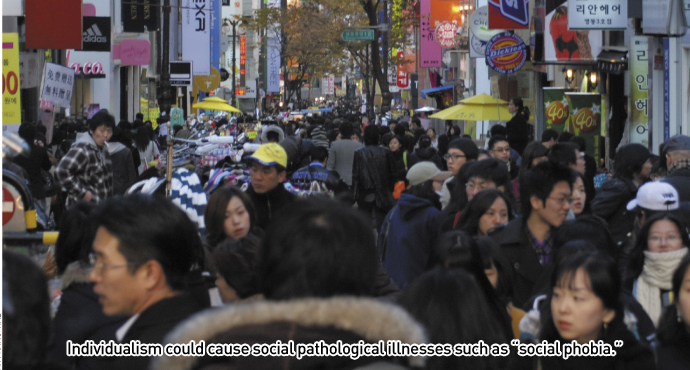A diagnosis of *naholojok* and where Korea lies between collectivism and individualism
YONSUNI FEELS relieved when the stressful class groupwork finishes after two weeks of frequent meetings. Working in groups is always distressing for her. Yonsuni then heads to Chunggyunggwan and reads the newspaper as she eats carbonara spaghetti. Eating lunch by herself has become a normal routine for her because she goes to most of her lectures alone. After school, she spends most of her time in her favorite book café, reading novels, and writing reports on her notebook computer. At night, she goes out to a nearby cinema to watch a French movie she has longed to see.
Does Yonsuni’s day sound a little peculiar to you? Or do you feel completely comfortable with her daily routine? If you have chose the latter, you have a high possibility of becoming a naholojok, or a cocoon, which refers to people who enjoy spending time alone without caring about how others view their attitude and in fact find pleasure in mild loneliness. They favor spendin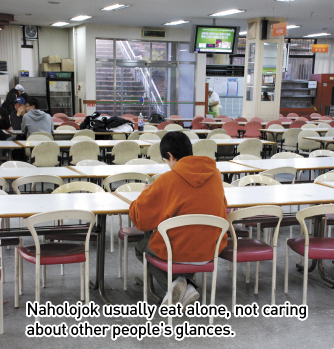 g time alone not because they do not have friends, but because they prefer to use their time effectively just for themselves.
g time alone not because they do not have friends, but because they prefer to use their time effectively just for themselves.
Naholojok have become a widespread phenomenon within Korean university campuses, which can be taken as a sign of an increase in individualism within Korean society. Intuitively, The Yonsei Annals surveyed 1,214 students to uncover Yonseians’ thoughts on naholojok and listen to their views as to where they think
Naholojok in Yonsei
It seems like naholojok are no longer strangers on Yonsei campus. When asked, How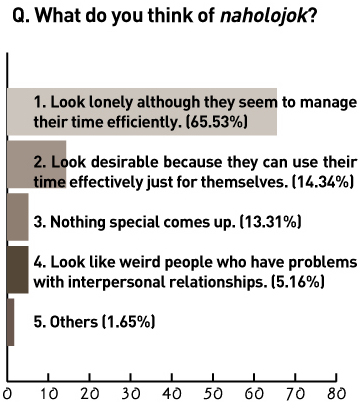 accustomed are you to seeing naholojok? The majority of Yonseians were quite used to seeing these naholojok who eat alone, study alone, or play alone. 56.99% students replied “quite used to,” followed by “very used to” (19.14%).
accustomed are you to seeing naholojok? The majority of Yonseians were quite used to seeing these naholojok who eat alone, study alone, or play alone. 56.99% students replied “quite used to,” followed by “very used to” (19.14%).
Now that we know how common naholojok are on campus, the Annals explored Yonseians’ thoughts on them. Most Yonseians think naholojok “look lonely although they seem to manage their time efficiently” (65.53%). Some thought that the lives of naholojok are “desirable because they can use their time effectively just for themselves” (14.34%). Only 5.16%, answered negatively stating, “naholojok look like weird people who have problems with interpersonal relationships.” Whang Sang-min (Prof., Dept. of Psych.) also comments, “Not only college students but also a striking number of Korean citizens who eat alone, drink coffee alone, or spend time alone has also become commonplace. A propensity for individualistic and self-reliant lifestyle is spreading throughout the society as a whole.”
Individualism among Yonseians
It is ob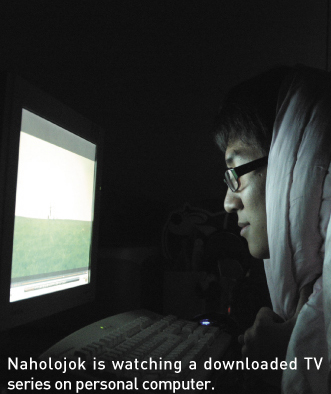 vious that more individualistic lifestyles are present among college students today compared to the past. To figure out individualism among Yonseians, the Annals asked, Do you like to spend time alone? 46.37% students answered “so so,” followed by “quite much” (28.80%). It turns out that Yonseians feel comfortable spending time alone. Yonseians answered that they usually “study or read books” (48.78%), “use the computer or surf the Internet” (19.07%), or “watch movies, TV, or DMB” (15.42%) when they are alone.
vious that more individualistic lifestyles are present among college students today compared to the past. To figure out individualism among Yonseians, the Annals asked, Do you like to spend time alone? 46.37% students answered “so so,” followed by “quite much” (28.80%). It turns out that Yonseians feel comfortable spending time alone. Yonseians answered that they usually “study or read books” (48.78%), “use the computer or surf the Internet” (19.07%), or “watch movies, TV, or DMB” (15.42%) when they are alone.
When asked, Why do you think naholojok spend time alone? 23.29% chose, “to behave according to one’s desires and choose activities of one’s choice, without any interruption from others.” 21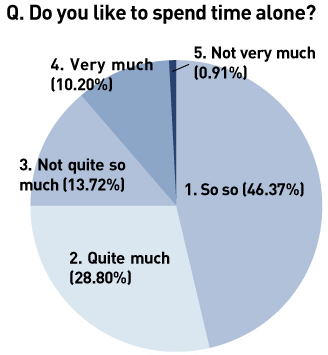 .35% thought naholojok isolate themselves “to use time efficiently according to their own schedule,” and 19.41% picked “to be free from the annoyance of having to adjust schedules with friends.” It is interesting to see how the top three answers are all related to time management. Counseling psychologist Lee Kyung-ah at the Institute for
.35% thought naholojok isolate themselves “to use time efficiently according to their own schedule,” and 19.41% picked “to be free from the annoyance of having to adjust schedules with friends.” It is interesting to see how the top three answers are all related to time management. Counseling psychologist Lee Kyung-ah at the Institute for
Clashes between individualism and collectivism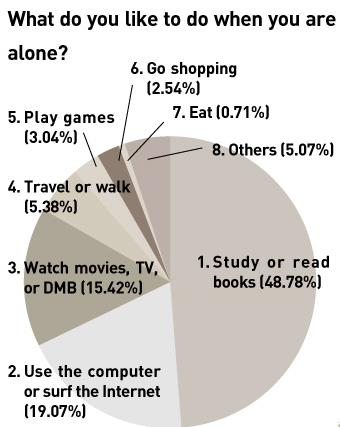
Individualistic lifestyles are becoming more common in Korean society. However, considering the long years of a dominant collective atmosphere within the Korean society, the current state of society cannot be easily categorized as individual or collective. Therefore, what do Yonseians think about the current state of Korean society? Most Yonseians think, “individualistic values are slowly increasing but collectivism is still dominant in Korean society” (57.98%). 22.08% students think, “collective values are decreasing, and the transition into an individualistic society is quickly progressing.” The opinion that “individualism and collectivism coexist equally” is believed by 18.6% of Yonseians. Prof. Whang suggests, “It is difficult to define the stage of individualism or collectivism in society because people’s behavior, whether individual or collective, is strongly dependent on situations. For example, a person who likes to read books alone in Starbucks could also be very devoted during group activities in companies.”
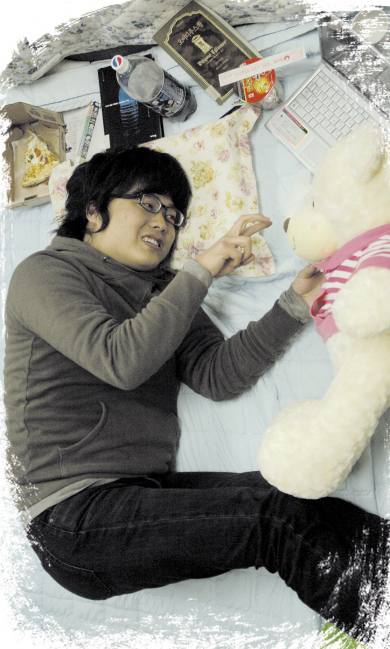 Keeping in mind the circumstances of people’s individual or collective behavior, the Annals wondered which situations are most likely to make Yonseians behave individually or collectively. Yonseians replied they sense collectivism in Korean society, “when group activity is forced in companies or other communities beyond what is necessary” (25.89%), “when it feels weird to eat or wander alone” (19.52%), and “when the majority of citizens participate in collective activities such as street cheering or candlelight vigils.” (19.44%)
Keeping in mind the circumstances of people’s individual or collective behavior, the Annals wondered which situations are most likely to make Yonseians behave individually or collectively. Yonseians replied they sense collectivism in Korean society, “when group activity is forced in companies or other communities beyond what is necessary” (25.89%), “when it feels weird to eat or wander alone” (19.52%), and “when the majority of citizens participate in collective activities such as street cheering or candlelight vigils.” (19.44%)
Conversely, Yonseians have experienced the individualism in Korean society “when they find their relationships to be more superficial than sincere” (42.29%) and “when witnessing ulterior motives when making new friends” (24.63%). Note that most Yonseians consider relationships among people valuable. Yet, it is easier for people to feel loneliness in today’s society. “Loneliness and problems concerning ‘interpersonal relationships’ take up 90% of the topics that students bring to the Yonsei Counseling Center for consultation. Loneliness is a problem that almost everyone is facing.” says Lee.
Yonseians’ understanding of individualism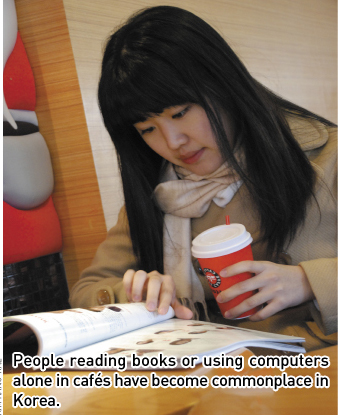
Individualism and collectivism are both witnessed in Korean society in different situations. However, considering the advent of naholojok, the influence of individualism is increasing and therefore should be given greater consideration. “Despite the gradual spread of individualism in
Now that we know how Yonseians perceive individualism, the Annals became curious about what Yonseians think about the statement regarding Yonseians’ individualism, which can be heard occasionally on campus. To the question, What do you think of the saying that “Yonsei students are individualistic”? 54.24% Yonseians expressed, “individualism is a common phenomenon found widely in college students, and is not limited to Yonsei.” Interestingly, 26.46% of Yonseians did consider themselves “more individualistic compared to students from other universities.”
Yonseians affected by individualism
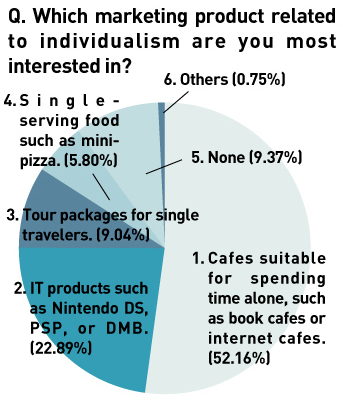 The increasing appearance of naholojok is one example of individualism’s effect on college students. Individualism can affect Yonseians in many ways, starting from a change in lifestyle, such as where to spend spare time, and where to spend money. To the question, Which marketing product related to individualism are you most interested in? 52.16% of students agreed that “cafés are suitable for spending time alone, such as book cafes or internet cafes,” followed by “IT products such as Nintendo DS, PSP, or DMB” (22.89%). Other interesting products included “tour packages for single travelers” (9.04%) and “single-serving food such as mini-pizza” (5.80%). As an example, Gogichon Plusbar, a barbeque restaurant in Shinchon, has bar-style tables, so that customers who come to eat barbeque alone do not feel intinimdated. It cannot be ignored that the advent of these products are intriguing the formation of naholojok.
The increasing appearance of naholojok is one example of individualism’s effect on college students. Individualism can affect Yonseians in many ways, starting from a change in lifestyle, such as where to spend spare time, and where to spend money. To the question, Which marketing product related to individualism are you most interested in? 52.16% of students agreed that “cafés are suitable for spending time alone, such as book cafes or internet cafes,” followed by “IT products such as Nintendo DS, PSP, or DMB” (22.89%). Other interesting products included “tour packages for single travelers” (9.04%) and “single-serving food such as mini-pizza” (5.80%). As an example, Gogichon Plusbar, a barbeque restaurant in Shinchon, has bar-style tables, so that customers who come to eat barbeque alone do not feel intinimdated. It cannot be ignored that the advent of these products are intriguing the formation of naholojok.
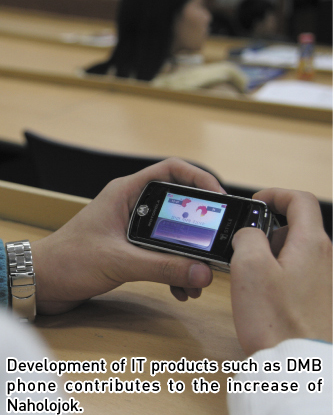 The power of individualism is so strong that it could affect Yonseians with or without their realization. To find out what positive and negative effects could arise from individualism, the Annals asked, What do you consider as the most positive effect of individualization that could be brought to society and the individual? 46.59% of students said, “each individuals’ differences could be respected,” and 23.54% said, “each individuals’ achievement level can improve, as expectations rather for individual than groups grow.” To the question about the negative effects, 41.08% of students replied “egoism may spread throughout society.” Other answers included, “students may have difficulty forming deep and diverse interpersonal relationships” (20.25%), “socially pathological problems such as ‘social phobia’ could arise” (17.76%), and “students used to individualism could have problems adapting to group systems in companies” (16.51%).
The power of individualism is so strong that it could affect Yonseians with or without their realization. To find out what positive and negative effects could arise from individualism, the Annals asked, What do you consider as the most positive effect of individualization that could be brought to society and the individual? 46.59% of students said, “each individuals’ differences could be respected,” and 23.54% said, “each individuals’ achievement level can improve, as expectations rather for individual than groups grow.” To the question about the negative effects, 41.08% of students replied “egoism may spread throughout society.” Other answers included, “students may have difficulty forming deep and diverse interpersonal relationships” (20.25%), “socially pathological problems such as ‘social phobia’ could arise” (17.76%), and “students used to individualism could have problems adapting to group systems in companies” (16.51%).
For a better future
As Yonseians have answered, diverse effects could arise from the influence of individualism. When directed in the right way, individualism can bring positive results such as respect for the diversity of individuals. However, when mislead, individualism can bring serious problems such as widespread egoism in society. Therefore, predicting the future of individualism and leading it in the right direction is essential. To the question, Where do you predict the location of Korean society between individualism and collectivism in next 20 years?, 54.28% of Yonseians predicted that “private time spent by individuals will increase but the way of thinking by Koreans is less likely to change” within 20 years. Yet, 27.85% of students thought that, “every individual’s way of thinking and behavior will become individualized.”
Whether the way of thinking for Koreans becomes individualized or not, it is evident that private time for individuals is increasing. The advent of nahalojok in our society is one clear evidence of increased private time for individuals. For a better future, we must comprehend individualism and know where we are heading. Various media in
* * *
Prof. Cho advises that “naholojok and students these days are too busy and burdened by competition, which deprive them of time for communication and interaction. Democracy and a better society rely on individuals. However, if students and the young generation of today avoid communication and cooperation with others, there can be no chance for society to get better.” Although it is important to manage time well and invest time wisely for self-development, communication skills and sympathizing skills to understand and work with others must not be neglected. For a better Korean society, the change to individualism should follow the right path, with the right understanding of individualism among today’s young generation.
